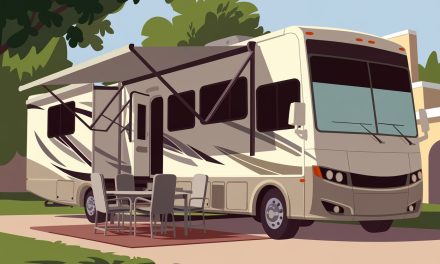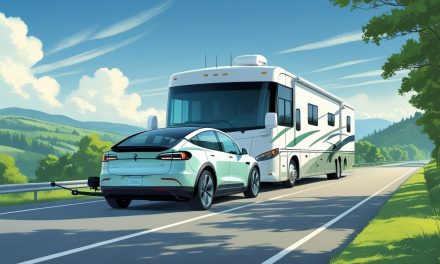Ever wonder why your favorite campground suddenly feels like a soulless parking lot? You’re not imagining things. Corporate takeovers of America’s beloved campgrounds have created a massive problem that’s leaving RV sites empty—even on holiday weekends.
The RV Wingman, a former campground owner who ran a successful 72-site park in Texas, reveals the shocking reasons why big money is failing miserably at what small owners do naturally. From hiring disasters to forgotten humanity, this story will change how you view every campground you visit.
Would you like to save this article?
1. Money Doesn’t Equal Brains (But Corporations Think It Does)
Corporate campground buyers waltz in with bulging wallets and massive egos. They drop millions on properties and assume their bank balance automatically makes them geniuses. Spoiler alert: It doesn’t. The RV Wingman learned through seven years of sweat, tears, and mistakes that time is the four-letter word that actually matters—not cash.
According to IBISWorld, the campground and RV park industry generates approximately $10.7 billion annually, with revenue growing at a compound annual growth rate (CAGR) of 4.3% over the past five years. With numbers like these, it’s no wonder corporate investors are salivating. But here’s the catch: 68% average occupancy rates for full hook-up sites tell only part of the story.
You’d think smart investors would realize that buying a campground isn’t like buying stocks. These corporate hotshots roll in thinking, “We’re rich, therefore we’re brilliant!” Then they proceed to ignore everything that actually made the campground successful in the first place. It’s like buying a restaurant and immediately firing the chef because, hey, how hard can cooking be?
2. Work Campers: The Budget Solution That Backfires Spectacularly
Here’s where corporate “cost-cutting genius” really shines. Instead of paying qualified employees decent wages, these companies rely heavily on work campers—essentially part-time gypsies who’ll disappear faster than free beer at a tailgate party.
The RV Wingman shared horror stories that would make any business owner cringe:
- The ex-con chef: A guy who supposedly went to “chef school” (translation: learned to cook in prison)
- The “lefty loosey, righty tighty” maintenance man: A general manager from Arizona who couldn’t even figure out how to unscrew a basic valve
| Work Camper Reality Check |
|---|
| Average Tenure: Days to weeks (not months) |
| Reliability Factor: Low to non-existent |
| Cost Savings: Disappear with unforeseen problems |
| Quality Impact: Massive decline in guest experience |
The work camping industry has seen growth alongside the rise of digital nomadism and remote work flexibility. Younger workampers are entering the scene, but the fundamental problem remains: trading 20 hours of work for a free campsite doesn’t create the kind of loyalty and excellence that guests remember.
You’re probably thinking, “Free labor sounds amazing!” Sure, until your work camper is hiding behind a cabin smoking cigarettes all day instead of actually, you know, working. Or they ghost you after two days because they found a campground closer to a better fishing spot. Real committed, aren’t they?
3. Dynamic Pricing: Making Customers Feel Like They’re Getting Scammed
Welcome to the wonderful world of dynamic pricing, where corporations think they’re being clever by charging different rates based on demand. Airlines do it! Hotels do it! Why not campgrounds?
Here’s why not: Your customers aren’t idiots.
When you charge someone $45 on Tuesday and $95 on Friday for the exact same dirt patch with a water hookup, you’re not being smart. You’re gouging people, and they know it. The beauty of traditional campground pricing was its simplicity and fairness.
According to the 2023 ARVC Benchmarking Report, parks that maintained consistent pricing structures reported higher repeat customer rates than those implementing aggressive dynamic pricing models. Industry data shows that peak season occupancy can reach near 100% at popular campgrounds during summer and holiday weekends—but only when customers actually want to come back.
Imagine telling your regular camping buddies that the Labor Day weekend site costs 130% more than the previous weekend. They’ll laugh, call you a few choice names, and book somewhere else. Congratulations—you just played yourself with your fancy pricing algorithm!
4. The Human Touch: What Corporations Forgot Exists
Remember when campgrounds felt like Mayberry? When the owner knew your name, asked about your kids, and genuinely cared whether you were having a good time? Yeah, corporations killed that vibe dead.
The RV Wingman emphasized that people will spend their last nickel to feel good. That’s the secret sauce! It’s not about contactless check-ins or fancy apps. It’s about the humanity—the warm welcome, the helpful staff member, the sense of community around the campfire.
| What Campers Really Want | What Corporations Provide |
|---|---|
| Friendly, knowledgeable staff | Understaffed, undertrained workers |
| Personal connections | Automated systems |
| Community atmosphere | Transactional experiences |
| Feeling valued | Feeling like account #47382 |
The RV Industry Association reports that 11.2 million American households owned RVs as of 2021—a 62% increase since 2001. These aren’t just customers; they’re people seeking connection, relaxation, and belonging. When you strip away the human element, you’re left with an expensive parking lot.
You know what happens when you replace real people with QR codes and apps? Your campground turns into the DMV of outdoor recreation. Nobody wants to vacation at the DMV. Nobody.
5. Team Building Takes Time (And Corporations Don’t Have Patience)
The RV Wingman compared his staff to the Tom Brady-era New England Patriots: Super Bowl after Super Bowl after Super Bowl. But that team wasn’t built overnight—it took years of mistakes, adjustments, and investment in the right people.
When the corporate buyers asked, “Why do you pay them so much?” they revealed their fatal flaw. The answer was simple: “Because they’re worth every penny.”
Within months of the sale, the entire championship team was gone. Fired, quit, or replaced with unreliable work campers. And guess what? The campground that used to have waiting lists for Labor Day weekend now runs desperate ads trying to fill sites.
Key Team-Building Insights:
- Take your staff on cruises and out to dinner
- Buy groceries and beer for team barbecues
- Treat employees like family, not expenses
- Pay more than they’re worth, not less
- Understand that different skill sets create the complete team
Industry research shows that campgrounds with low staff turnover consistently outperform those with revolving-door employment. The 2025 Outdoor Hospitality Report by RoverPass noted that small parks with dedicated staff maintained stronger occupancy rates than larger corporate facilities during economic downturns.
Turns out when you treat people like replaceable widgets, they actually do get replaced—by better employers who value them. Who knew? (Literally everyone except corporate executives, apparently.)
6. Gimmicks Over Substance: Water Parks Can’t Fix a Rotten Foundation
Corporate campgrounds love throwing money at shiny objects: elaborate playgrounds, miniature golf, water parks, and expensive upgrades. They think these amenities will magically bring customers flooding back.
Plot twist: They won’t.
Sure, fancy facilities might attract first-time visitors. But if your staff is terrible, your pricing is insulting, and your vibe is colder than a Minnesota winter, those guests aren’t coming back. You might get them once—probably will, actually—but good luck seeing them again.
The Amenity Trap:
| What Actually Drives Repeat Visits | What Corporations Invest In |
|---|---|
| Quality staff interactions | Expensive infrastructure |
| Fair, transparent pricing | Dynamic pricing algorithms |
| Community atmosphere | Contactless everything |
| Genuine hospitality | Flashy amenities |
The Campspot 2024 Camping Trends Outlook emphasized that campers increasingly seek therapeutic effects and authentic connections rather than resort-style attractions. The RV lifestyle is about simplicity, nature, and community—not turning every campground into Disneyland.
You’ve built a gorgeous water park, but your check-in person has the personality of a cactus and the work campers haven’t mowed in two weeks. Great investment strategy! It’s like putting racing stripes on a car with a broken engine.
7. Repeat Customers: The Goldmine Corporations Are Ignoring
Here’s the billion-dollar secret that small campground owners understand intuitively: repeat customers are everything. They’re your bread and butter, your safety net, your word-of-mouth marketing machine.
The RV Wingman’s campground had a waiting list during his ownership. Not because of dynamic pricing or fancy apps, but because people loved being there. They felt valued, cared for, and genuinely welcome. So they came back. And they told their friends.
Corporate campgrounds have destroyed this model. By focusing on maximum extraction of money from each transaction rather than building long-term relationships, they’ve killed the goose that laid the golden eggs.
Statistics on Customer Loyalty:
- Average campground guests stay 2.5 to 3.5 nights per visit
- Weekend and holiday visits generate premium revenue
- Parks with strong repeat customer bases maintain 70%+ occupancy even during economic downturns
- Word-of-mouth recommendations remain the top way campers discover new parks
The U.S. RV Park Industry Analysis (2025) projects revenues will grow to $11.4 billion by 2028, but warns that market consolidation risks “homogenizing the customer experience” and reducing regional character that attracts loyal visitors.
You can have all the money in the world, but if people don’t want to spend their vacation dollars at your soulless corporate camp-resort, you’re going to watch those empty sites multiply. And no amount of Google Ads will fix the fact that you forgot camping is supposed to be fun.
SOURCES:
- RV Industry Association – Reports & Trends
- IBISWorld – Campgrounds & RV Parks in the US Industry Analysis, 2025
- Sage Outdoor Advisory – RV Resort Industry Overview 2024
- Modern Campground – Campspot’s 2024 Camping Trends Outlook
- RV Industry Association – 2024 RV Industry Profile
- ConsumerAffairs – RV Industry Statistics 2025
- RV Business – RoverPass’ 2025 Outdoor Hospitality Report
- Loan Analytics – U.S. RV Park Industry Trends & Analysis (2025)
- Outdoor Hospitality Industry – 2023 Benchmarking Report (PDF)
- RoverPass Blog – RV Park Industry Statistics
- Sovereign Magazine – The Rise Of Work-Camping
- Roam Ready Network – Are Younger Workampers on the Rise?
- YouTube – RV Wingman: How & Why Big Corporate Campgrounds Are Failing







